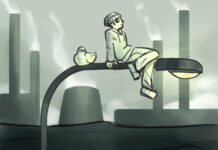I remember learning about the Duomo, the dome of the Florence Cathedral, in art history Professor Eric Frank’s “Art of the Early Italian Renaissance” (ARTH 374) class in the Fall 2012 Semester. Frank and I were meeting about my final paper for the class and he asked me if I had ever seen the Duomo in person. I regretfully admitted that I had not.
“You will,” he assured me.
The academic experiences I had in Occidental’s art history department unequivocally inspired my decision to study abroad in Rome because I wanted to see all the Italian art I was studying. I had to see the Dome of the Florence Cathedral.
However, upon arriving in Rome last fall, I realized the focus of my abroad program deviated from cultural and intellectual curiosity to an infatuation with partying. I was not prepared for the American college student culture that has taken over Rome and other European cities for the worse. Stripped from the social and academic constructs of their schools in the U.S., many American students use their study abroad opportunities as a time to party instead of experiencing new cultures and enriching their academic careers. Students should be more focused on immersing themselves in the customs of unfamiliar countries instead of using abroad opportunities as a continuation of American college drinking culture.
During our first week in Rome, students in my program partied at bars and clubs until the wee hours of the morning, a habit that did not let up even after the novelty of living in a vibrant city wore off. While staying out late each night is a cultural norm in some European cities, like Barcelona, it is not the Italian way. In 2008, NPR reported how widespread binge drinking and raucous behavior from American students was becoming the norm in Florence. The recent phenomenon arose due to more and more college students choosing to study abroad in Italy.
The article mentions Letizia Biagi, a saleswoman at a leather goods shop in Florence and local who was upset by American college students’ raunchy behavior.
“Italians go to pubs only on weekends, but the Americans are there every night,” Biagi said in the article.
More bars and clubs have popped up in the past 20 years or so in Italian cities like Rome and Florence, specifically catering to the American study abroad drinking culture. While this may be due to American students’ infatuation with being able to legally drink abroad, it is also related to the fact that American study abroad semesters are unfettered by the cultural restrictions of their college experiences in the United States.
Last week, John Durkin, a 21-year-old economics major from Bates College was reported missing in Rome. He was last seen at Sloppy Sam’s, a bar frequented by American study abroad students. A day later he was found dead in a train tunnel in Rome. The event is tragic and shocking. It is every parent’s worst nightmare. I personally have not stopped thinking about the terrible circumstances of his death because Durkin was participating in the program from which I just returned.
The program, based out of Trinity College in Hartford, Conn., consists of about 55 students who all live together in a convent in an affluent neighborhood in Rome. All students eat breakfast and lunch together daily and students spend hours with each other on walking tours of the city. The professors organize program-wide trips around Italy, and after two weeks in Rome, I knew every student in the program by name. It is a unique community led by erudite Italian teachers, and I cannot fathom losing a peer while studying there.
However, each night, like clockwork, students from the program would head to the bars and clubs where they were met by other Americans and local Italian men who often targeted Americans to pickpocket.
Sloppy Sam’s, where Durkin was last seen alive by his friends, is in Campo de’ Fiori, a historic square in the heart of Rome that houses bars which cater to the American study abroad nightlife. Sloppy Sam’s and The Drunken Ship, eponymously named, are popular pubs where students get very drunk and very sloppy. But why shouldn’t they? The academic curriculum in Rome is less rigorous than Occidental’s. Students do not have meetings with their advisers the next morning and extra curricular commitments like clubs and sports were not part of students’ schedules. Drunkenly flocking around Campo de’ Fiori on a Wednesday night, study abroad students could gleefully have the “when in Rome” mentality and then throw back another shot of Tequila.
Before I arrived in Rome, I was passed down a list of recommendations for places to go in the city from former Occidental students who had studied abroad in Trinity. The first category on the list is “Clubs/Bars,” where there are detailed descriptions for the Drunken Ship and Sloppy Sam’s. The document has many more names of bars and clubs to choose from, and the rest of the list consisted of restaurant recommendations. There are no museum suggestions, no monument highlights and no advice to culturally immerse oneself in the Eternal City.
Regardless, most Occidental students have academic preparation before they go abroad in anticipation of experiences that are both academically and personally transformative. Many Occidental students even thread their abroad experiences back into their coursework upon returning to Los Angeles. However, too many students neglect the academic intentions of their abroad experience in order to focus on going out and partying.
The opportunity to study abroad as a college student is valuable because it makes students take risks studying new languages, meeting new people and living in an unfamiliar culture. According to Open Doors, a comprehensive information resource on international students 38 percent of the 300,000 students who study abroad annually study in England, Italy, France or Spain. The high percentage of American students studying abroad in these countries contributes to the fact that students are taking less intellectual risks and are instead engaging in riskier behavior. This trend seems to be a growing problem as American students try to replicate the experiences their peers had in semesters before them, myself included.
I bought drinks at the Drunken Ship at the start of my semester abroad ,and I’ve barhopped around neighborhoods in Rome on a weekday night. But I quickly realized that this type of abroad experience wasn’t for me, and as the semester went on I traveled most weekends and filled my days with Italian art. I even visited Florence three times, each time stunned by the beauty of the Duomo.
Taylor Majewski is a junior art history major. She can be reached at majewski@oxy.edu or on Twitter @WklyTMajewski.
![]()































Hey Taylor, great article. You put into words exactly how I felt about my abroad experience with TCRC. I’m so glad you were able to make the best of the situation and explore museums and sites – I did exactly the same.
Madi
For many students studying abroad is equivalent to partying abroad. It is not much about exploring different language and cultures. Totally agree with you!